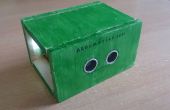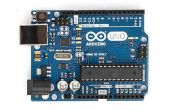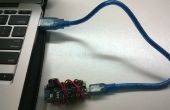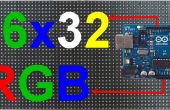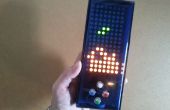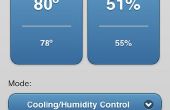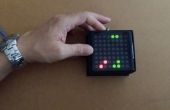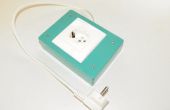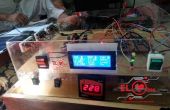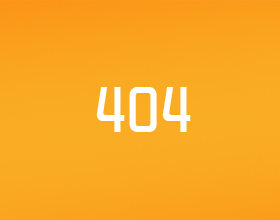Paso 3: programación
Después de tener el circuito conectado, es el momento de añadir el código para el Arduino, el código incluye la "pitches.h" biblioteca, así que asegúrese de que usted mantenga la biblioteca dentro de la misma carpeta que la carpeta de código E-Piano.
El código utiliza principalmente el método ClickButton() para determinar qué botón ha sido presionado para jugar de una determinada frecuencia. Se asignan las frecuencias de Do Re Mi Fa Sol La Si en la matriz de [] de melody1. No son 100 por ciento exacta así que usted puede mantener calibrado les hasta que obtengas un mejor resultado. Publique su matriz melody1 en la sección de comentarios más abajo si desea compartir un mejor calibrado notas musicales.
El método de tono se utiliza para enviar el PWM al ponente, pasa dos parámetros, el pin del altavoz y el tono. Usted puede utilizar el noTone(Speaker Pin #) para poner fin a cualquier información sobre la reproducción.
Subir el siguiente código para el Arduino para utilizar su E-Piano. Asegúrese de descargar la biblioteca "pitches.h" y mantenerlo en la misma carpeta que el código.
/* Developed in Fablab DHAHRAN - Mado * www.fablabdhahran.org * * Special thanks to PrinceTronics for their SuperMarioBros Theme melody * http://www.princetronics.com/supermariothemesong/ */
#include "pitches.h" #define melodyPin 3
int Do = 4; int Re = 5; int Mi = 6; int Fa = 7; int Sol = 8; int La = 9; int Si = 10; int Marioo = 11;
int LED_SYNC = 13;
const int Delay = 120;
int Speaker = 3;
int melody1[] = {NOTE_C4, NOTE_D4,NOTE_E4, NOTE_F4, NOTE_G4, NOTE_A4, NOTE_B4, NOTE_C5}; int melody[] = { NOTE_E7, NOTE_E7, 0, NOTE_E7, 0, NOTE_C7, NOTE_E7, 0, NOTE_G7, 0, 0, 0, NOTE_G6, 0, 0, 0, NOTE_C7, 0, 0, NOTE_G6, 0, 0, NOTE_E6, 0, 0, NOTE_A6, 0, NOTE_B6, 0, NOTE_AS6, NOTE_A6, 0, NOTE_G6, NOTE_E7, NOTE_G7, NOTE_A7, 0, NOTE_F7, NOTE_G7, 0, NOTE_E7, 0, NOTE_C7, NOTE_D7, NOTE_B6, 0, 0, NOTE_C7, 0, 0, NOTE_G6, 0, 0, NOTE_E6, 0, 0, NOTE_A6, 0, NOTE_B6, 0, NOTE_AS6, NOTE_A6, 0, NOTE_G6, NOTE_E7, NOTE_G7, NOTE_A7, 0, NOTE_F7, NOTE_G7, 0, NOTE_E7, 0, NOTE_C7, NOTE_D7, NOTE_B6, 0, 0 }; //Mario main them tempo int tempo[] = { 12, 12, 12, 12, 12, 12, 12, 12, 12, 12, 12, 12, 12, 12, 12, 12, 12, 12, 12, 12, 12, 12, 12, 12, 12, 12, 12, 12, 12, 12, 12, 12, 9, 9, 9, 12, 12, 12, 12, 12, 12, 12, 12, 12, 12, 12, 12, 12, 12, 12, 12, 12, 12, 12, 12, 12, 12, 12, 12, 12, 12, 12, 12, 9, 9, 9, 12, 12, 12, 12, 12, 12, 12, 12, 12, 12, 12, 12, }; //Underworld melody int underworld_melody[] = { NOTE_C4, NOTE_C5, NOTE_A3, NOTE_A4, NOTE_AS3, NOTE_AS4, 0, 0, NOTE_C4, NOTE_C5, NOTE_A3, NOTE_A4, NOTE_AS3, NOTE_AS4, 0, 0, NOTE_F3, NOTE_F4, NOTE_D3, NOTE_D4, NOTE_DS3, NOTE_DS4, 0, 0, NOTE_F3, NOTE_F4, NOTE_D3, NOTE_D4, NOTE_DS3, NOTE_DS4, 0, 0, NOTE_DS4, NOTE_CS4, NOTE_D4, NOTE_CS4, NOTE_DS4, NOTE_DS4, NOTE_GS3, NOTE_G3, NOTE_CS4, NOTE_C4, NOTE_FS4, NOTE_F4, NOTE_E3, NOTE_AS4, NOTE_A4, NOTE_GS4, NOTE_DS4, NOTE_B3, NOTE_AS3, NOTE_A3, NOTE_GS3, 0, 0, 0 }; //Underwolrd tempo int underworld_tempo[] = { 12, 12, 12, 12, 12, 12, 6, 3, 12, 12, 12, 12, 12, 12, 6, 3, 12, 12, 12, 12, 12, 12, 6, 3, 12, 12, 12, 12, 12, 12, 6, 6, 18, 18, 18, 6, 6, 6, 6, 6, 6, 18, 18, 18, 18, 18, 18, 10, 10, 10, 10, 10, 10, 3, 3, 3 }; void setup(void) { Serial.begin(9600); pinMode(LED_SYNC, OUTPUT); pinMode(melodyPin, OUTPUT);//buzzer pinMode(Do, INPUT); pinMode(Re, INPUT); pinMode(Mi, INPUT); pinMode(Fa, INPUT); pinMode(Sol,INPUT); pinMode(La, INPUT); pinMode(Si, INPUT); pinMode(Marioo,INPUT); } void loop() { ClickButton(); } int song = 0; void sing(int s) { song = s; if (song == 2) { Serial.println(" 'Underworld Theme'"); int size = sizeof(underworld_melody) / sizeof(int); for (int thisNote = 0; thisNote < size; thisNote++) { // to calculate the note duration, take one second // divided by the note type. //e.g. quarter note = 1000 / 4, eighth note = 1000/8, etc. int noteDuration = 1000 / underworld_tempo[thisNote]; buzz(melodyPin, underworld_melody[thisNote], noteDuration); // to distinguish the notes, set a minimum time between them. // the note's duration + 30% seems to work well: int pauseBetweenNotes = noteDuration * 1.30; delay(pauseBetweenNotes); // stop the tone playing: buzz(melodyPin, 0, noteDuration); } } else { Serial.println(" 'Mario Theme'"); int size = sizeof(melody) / sizeof(int); for (int thisNote = 0; thisNote < size; thisNote++) { // to calculate the note duration, take one second // divided by the note type. //e.g. quarter note = 1000 / 4, eighth note = 1000/8, etc. int noteDuration = 1000 / tempo[thisNote]; buzz(melodyPin, melody[thisNote], noteDuration); // to distinguish the notes, set a minimum time between them. // the note's duration + 30% seems to work well: int pauseBetweenNotes = noteDuration * 1.30; delay(pauseBetweenNotes); // stop the tone playing: buzz(melodyPin, 0, noteDuration); } } } void buzz(int targetPin, long frequency, long length) { digitalWrite(13, HIGH); long delayValue = 1000000 / frequency / 2; // calculate the delay value between transitions //// 1 second's worth of microseconds, divided by the frequency, then split in half since //// there are two phases to each cycle long numCycles = frequency * length / 1000; // calculate the number of cycles for proper timing //// multiply frequency, which is really cycles per second, by the number of seconds to //// get the total number of cycles to produce for (long i = 0; i < numCycles; i++) { // for the calculated length of time... digitalWrite(targetPin, HIGH); // write the buzzer pin high to push out the diaphram delayMicroseconds(delayValue); // wait for the calculated delay value digitalWrite(targetPin, LOW); // write the buzzer pin low to pull back the diaphram delayMicroseconds(delayValue); // wait again or the calculated delay value } digitalWrite(13, LOW); } void ClickButton(){ if(digitalRead(Do) == 1){ Serial.println("DO"); digitalWrite(LED_SYNC, HIGH); tone(Speaker, melody1[0]); delay(Delay); }else if(digitalRead(Re) == 1){ Serial.println("RE"); digitalWrite(LED_SYNC, HIGH); tone(Speaker, melody1[1]); delay(Delay); }else if(digitalRead(Mi) == 1){ Serial.println("MI"); digitalWrite(LED_SYNC, HIGH); tone(Speaker, melody1[2]); delay(Delay); }else if(digitalRead(Fa) == 1){ Serial.println("FA"); digitalWrite(LED_SYNC, HIGH); tone(Speaker, melody1[3]); delay(Delay); }else if(digitalRead(Sol) == 1){ Serial.println("SOL"); digitalWrite(LED_SYNC, HIGH); tone(Speaker, melody1[4]); delay(Delay); }else if(digitalRead(La) == 1){ Serial.println("La"); digitalWrite(LED_SYNC, HIGH); tone(Speaker, melody1[5]); delay(Delay); }else if(digitalRead(Si) == 1){ Serial.println("Si"); digitalWrite(LED_SYNC, HIGH); tone(Speaker, melody1[6]); delay(Delay); }else if(digitalRead(Marioo) == 1){ Serial.println("Marioo"); digitalWrite(LED_SYNC, HIGH); sing(1); sing(2); delay(Delay); }else{ digitalWrite(LED_SYNC, LOW); noTone(Speaker); } }

